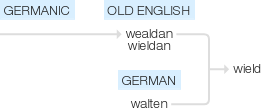Wield
Old English wealdan, wieldan ‘govern, subdue, direct’, of Germanic origin; related to German walten .
wiktionary
From Middle English wēlden, which combines forms from two closely related verbs: Old English wealdan(“to control, rule”)(strong class 7) and Old English wieldan(“to control, subdue”)(weak). The reason for the merger was that in Middle English the -d in the stem made it hard to distinguish between strong and weak forms in the past tense. Both verbs ultimately derive from Proto-Germanic *waldaną(“to rule”). [1]
etymonline
wield (v.)
Old English weldan (Mercian), wieldan, wealdan (West Saxon) "have power over, compel, tame, subdue" (class VII strong verb; past tense weold, past participle gewealden), merged with weak verb wyldan, both from Proto-Germanic *waldan "to rule" (source also of Old Saxon and Gothic waldan, Old Frisian walda "to govern, rule," Old Norse valda "to rule, wield, to cause," Old High German waltan, German walten "to rule, govern").
The Germanic words and cognates in Balto-Slavic (Old Church Slavonic vlado "to rule," vlasti "power," Russian vladeti "to reign, rule, possess, make use of," Lithuanian veldu, veldėti "to rule, possess") probably are from PIE *woldh-, extended form of root *wal- "to be strong, to rule." Related: Wielded; wielding.
